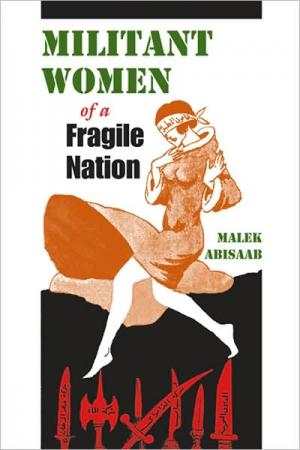Militant Women of a Fragile Nation

This account of women’s central role in the industrial history of Lebanon adds another valuable title to Syracuse’s outstanding series of books on Middle Eastern history and culture, “Beyond Dominant Paradigms.” In stark contrast to images of women as helpless victims that pervade much of the depiction of the region consumed by the Western press, Malek Abisaab’s Militant Women of a Fragile Nation shows women’s transforming role in colonial and postcolonial industrialization, in the labor struggles and resistance to colonial rule, in the work of trade unions and the Arab Feminist Union, and in the modern Lebanese economy.
From the “silk economy” at the center of industrialization in the nineteenth century through the rise and dominance of the tobacco industry, women have largely negotiated and renegotiated their own position in industry. The author rejects the subaltern view of these women and their identity within the social and economic history of Lebanon: through active participation and protest, women have resisted exclusion from power and have contributed to a culture of changing alliances and class and gendered identities that are constantly in play. Through various power structures and economic models, women demonstrated, in Abisaab’s view, that “patriarchy cannot endure for long or unchangingly,” and that the women he studies are not “passive victims of capitalism” but strategically engaged in a resistance that has played a major role in shaping the modern economy.
Militant Women of a Fragile Nation begins with an account of the region known as Mount Lebanon in the later nineteenth century, and women’s involvement in silk production. As women moved into the workplace, they struggled against patriarchal control of their sexuality and an exploitative wage system that paid them half as much as men—whose work was gendered as “skilled” labor. As the silk economy declined, women dominated the “unskilled” part of the workforce in tobacco—and again earned subsistence wages while exposed to toxic chemicals in the factories.
During the period of French colonial rule of Syria-Lebanon, the French imposed the Régie, a monopolistic cartel governing tobacco production. It was during this time that women had a definable target for social action and struggled for improved conditions and resistance to colonial control. In the early years of the twentieth century, the Syrian-Lebanese “New Woman” emerged as a cultural phenomenon, and by the 1930s the Arab Feminist Union was organized to campaign against the Régie.
While there are differences in attitudes among women of different classes, the data the author accumulates shows a consistently remarkable level of women’s participation in the work force over the past 130 years. While women of the elite classes actively resisted colonial dominance, they tended to denigrate women’s participation in paid labor. “Factory women,” on the other hand, identified profoundly with their gender roles in the work place, and the factory became a site for active participation and reconsideration of their roles and identities. For both groups, women’s radicalism has had a shaping role in the economic history of the region.